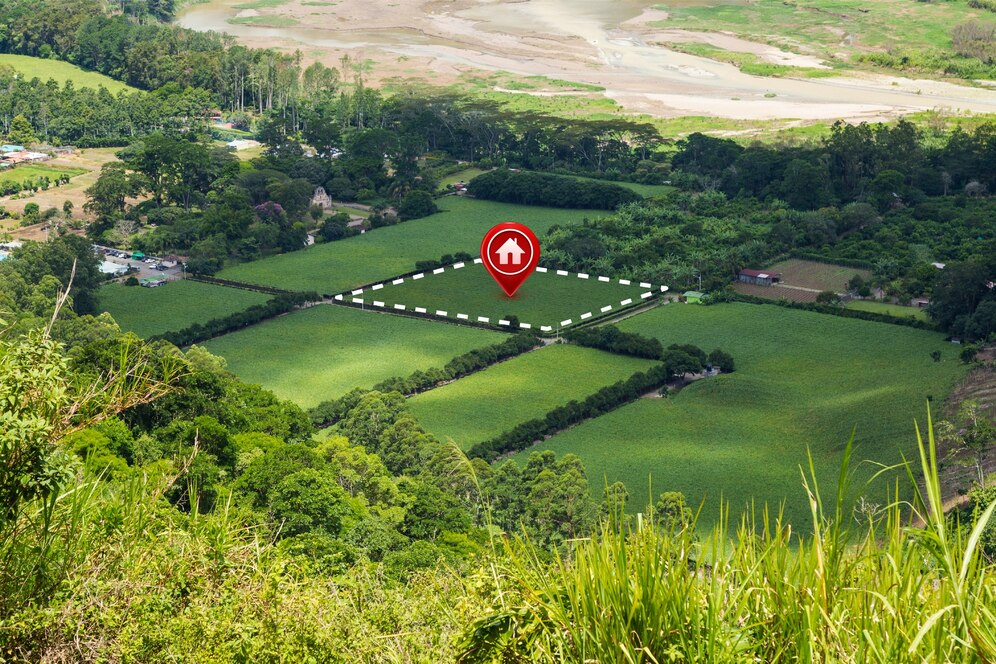
Selling land online in Virginia has become an increasingly popular and effective way to reach buyers without the limitations of traditional real estate transactions. Whether you own rural acreage, commercial land, or residential plots, the right approach can help you sell your land efficiently and at the best possible price.
This guide will walk you through the entire process—from understanding the Virginia land market to selecting the best selling platform, pricing your land strategically, and ensuring a smooth closing. By following these steps, you can confidently navigate the online selling process and maximize your land’s value.

Benefits of Selling Land Online
Selling land online offers a modern, efficient approach that connects sellers with a broader pool of potential buyers, streamlining the transaction process and maximizing profitability. Unlike traditional methods that rely on local real estate agents or word-of-mouth marketing, online platforms provide instant visibility to investors, developers, and individuals actively searching for land in Virginia. This digital approach not only increases exposure but also accelerates negotiations, reduces costs, and allows for a more flexible, seller-controlled experience. Whether you’re looking for a quick sale or aiming to secure the highest possible price, leveraging online tools and platforms can help you achieve your goals with ease and efficiency.
Wider Market Reach
Traditional land sales often rely on local buyers and real estate agents. Selling online, however, allows you to market your property to buyers across the state, country, or even internationally. Investors, developers, and individuals searching for land in Virginia can easily find your listing through online marketplaces, maximizing exposure and increasing the likelihood of a quick sale.
Faster Transactions
Selling land through digital platforms can significantly speed up the process. Unlike traditional real estate transactions that involve numerous in-person showings and paperwork, online selling allows buyers to view listings, submit offers, and complete transactions remotely. This streamlined process reduces delays and accelerates closing.
Convenience and Cost-Effectiveness
Online land sales eliminate the need for expensive advertising, extensive in-person marketing, and commissions associated with real estate agents. Many platforms offer affordable listing options, and some allow direct sales without intermediary fees, making it a cost-effective solution for landowners.

Understanding the Virginia Land Market
Understanding the Virginia land market is crucial for setting the right price, attracting the right buyers, and ensuring a smooth sale. Virginia’s diverse landscape—ranging from the Blue Ridge Mountains to the coastal plains—offers unique opportunities for investors, developers, and private buyers. Market demand varies across regions, influenced by factors such as economic growth, infrastructure development, and zoning regulations. Whether you're selling rural farmland, residential lots, or commercial parcels, having a solid grasp of current market trends, land valuation factors, and legal considerations will position you for a successful transaction.
Key Trends in Virginia Real Estate
Virginia’s land market varies by region. Northern Virginia sees high demand due to its proximity to Washington, D.C., while rural areas in western and southern Virginia attract buyers interested in farming, recreation, or development. Coastal regions offer prime real estate for vacation homes and commercial investment. Keeping up with local trends helps in pricing your land competitively.
Factors Affecting Land Value
Several factors influence land value, including:
- Location: Proximity to cities, highways, and amenities impacts desirability.
- Zoning Regulations: Determines permitted land use (residential, commercial, agricultural, etc.).
- Utilities & Infrastructure: Availability of water, electricity, sewage, and roads increases value.
- Topography & Soil Quality: Suitability for construction, farming, or other uses.
Zoning, Permits, and Regulations
Understanding zoning laws is essential before listing your land. Virginia’s local municipalities govern zoning restrictions, and you may need permits for specific land uses. Checking with local planning departments can help avoid legal issues.

Preparing Your Land for Sale
Before listing your land online, proper preparation is essential to attract serious buyers and maximize your property’s value. Unlike selling a home, where staging and interior upgrades play a role, selling land requires a strategic approach focused on pricing, documentation, and presentation. Buyers want clear, accurate information about the property’s potential, including zoning regulations, accessibility, and infrastructure availability. Ensuring your land is well-documented, visually appealing, and competitively priced will not only streamline the sales process but also help you secure the best possible deal. Let’s break down the key steps to get your land market-ready.
Determining Market Value
Accurate pricing is critical. Compare similar land sales in your area using online tools like Zillow, LandWatch, or local property tax assessments. Consulting a land appraiser can also provide a precise valuation.
Gathering Essential Documents
Ensure you have the following documents ready:
- Deed: Proof of ownership.
- Survey Map: Outlines property boundaries.
- Tax Records: Confirms tax status and assessments.
- Zoning & Land Use Information: Provides buyers with clarity on property potential.
Enhancing Curb Appeal and Accessibility
While land doesn’t require staging like homes, maintaining a clean, accessible property helps attract buyers. Clear debris, mow overgrown areas, and provide accessible entry points for potential buyers.

Choosing the Right Selling Platform
Choosing the right online selling platform is a crucial step in ensuring a smooth and successful land sale. Not all platforms are created equal—some cater specifically to investors and developers, while others attract residential buyers looking for a personal-use property. Understanding the strengths and limitations of each option will help you determine the best fit for your specific land type, location, and sales goals. Whether you opt for a dedicated land marketplace, an auction platform, or a direct sale through a classified listing, selecting the right avenue can significantly impact your selling experience, market exposure, and final sale price.
Online Marketplaces
Online marketplaces provide a powerful platform for reaching a wide audience of potential buyers, from local investors to out-of-state land seekers. These platforms allow sellers to showcase their property with detailed descriptions, images, and key information, making it easy for buyers to evaluate and inquire about the land. Listing on multiple marketplaces increases visibility, attracting competitive offers and potentially speeding up the sale. To maximize success, sellers should choose platforms that align with their target audience, ensure their listing is complete and compelling, and remain responsive to buyer inquiries to facilitate a smooth transaction.
Auction Websites vs. Direct Sales
When selling land online, you can choose between auction websites and direct sales, each with its advantages. Auctions create a competitive bidding environment that can lead to a quick sale, but the final price may be lower than expected, depending on demand. Direct sales, on the other hand, allow for greater control over pricing and negotiations, giving you the flexibility to set terms that align with your goals. The best option depends on your timeline, pricing strategy, and willingness to negotiate with buyers.
Working with Land Brokers and Agents
While selling online can be done independently, working with a land broker or specialized agent can help navigate legal complexities, marketing, and negotiations.

Creating a Compelling Land Listing
Creating a compelling land listing is one of the most critical steps in selling your property online. A well-crafted listing not only attracts potential buyers but also sets the stage for a smooth and successful transaction. Buyers searching for land in Virginia often have specific needs—whether it's acreage for development, farmland, or recreational space—and your listing should clearly highlight what makes your property unique. From writing a detailed and engaging property description to showcasing high-quality images and essential property details, an effective listing maximizes exposure and generates serious interest. In this section, we’ll cover the key elements that make a land listing stand out in a competitive market.
Writing an Effective Property Description
Highlight key selling points in a clear, informative manner. Include details such as:
- Lot size and dimensions
- Topography (flat, hilly, wooded, waterfront, etc.)
- Zoning and potential land uses
- Nearby attractions, roads, and amenities
High-Quality Photos and Drone Footage
Visual appeal is crucial in online listings. Invest in professional photos and drone footage to showcase the land’s features, surroundings, and accessibility.
Key Details to Include
When listing your land online, providing clear and comprehensive details is essential to attracting serious buyers and streamlining the sales process. A well-structured listing should include key property specifics that help buyers assess the land’s value and potential. Essential details such as acreage, location, zoning, utilities, and accessibility not only enhance transparency but also set realistic expectations, reducing back-and-forth inquiries. By including this critical information upfront, you can position your property competitively and increase the likelihood of a faster, smoother sale.
- Acreage
- Location (county, city, nearest major roads)
- Utilities and infrastructure availability
- Price and financing options (if applicable)

Pricing Strategies and Negotiation
Setting the right price for your land is one of the most critical steps in securing a successful sale. Overpricing can deter potential buyers, leaving your property on the market for an extended period, while underpricing may result in lost value. A well-researched pricing strategy ensures that your land attracts serious buyers while maximizing your return. Additionally, negotiation plays a key role in closing deals—buyers may submit offers below your asking price, and understanding how to navigate counteroffers and contract terms can make a significant difference. By leveraging market data, strategic pricing methods, and effective negotiation tactics, you can position your land competitively and achieve the best possible outcome.
Competitive Pricing vs. Quick Sale Pricing
Pricing your land strategically is essential to attracting the right buyers and maximizing your return. The approach you take will depend on your goals—whether you aim for the highest possible price through competitive market positioning or prefer a faster sale by pricing below market value. Competitive pricing involves thorough market research to set a price that aligns with similar properties, ensuring strong buyer interest without overpricing. On the other hand, quick sale pricing prioritizes speed, often appealing to cash buyers or investors looking for immediate opportunities. Understanding the advantages and trade-offs of each strategy will help you make an informed decision that aligns with your selling objectives.
- Competitive Pricing: Based on market research, it aims for maximum profit.
- Quick Sale Pricing: Lower than market value but attracts immediate buyers.
Handling Offers and Counteroffers
Be prepared to negotiate. If a buyer offers below your asking price, consider counteroffers with reasonable adjustments while maintaining profitability.
Understanding Legal and Tax Implications
Selling land may involve capital gains taxes, transfer fees, and closing costs. Consulting a real estate attorney or accountant helps navigate these obligations.

Closing the Sale
Closing the sale is the final and most crucial step in selling your land online in Virginia. A smooth closing process ensures that ownership is legally transferred, all financial obligations are settled, and both parties are protected. Whether you're working with a title company, real estate attorney, or handling the transaction independently, it’s essential to follow proper legal procedures to avoid delays or disputes. Understanding the necessary contracts, payment methods, and title transfer requirements will help you finalize the deal with confidence and efficiency. In this section, we’ll cover everything you need to know to close your land sale successfully.
Purchase Agreements and Contracts
A legally binding agreement should include:
- Buyer and seller details
- Property description
- Sale price and payment terms
- Contingencies (e.g., survey results, title clearance)
Working with Title Companies and Attorneys
A title company ensures a clean title transfer, while an attorney can draft or review contracts, protecting both parties' interests.
Finalizing Payment and Transfer of Ownership
The final step includes receiving payment and officially transferring the deed. Use escrow services for secure transactions and record the deed transfer with the county.

Avoiding Common Pitfalls
Selling land online in Virginia offers many advantages, but it also comes with potential risks that sellers must navigate carefully. From fraudulent buyers to unexpected costs, overlooking critical details can lead to financial loss or legal complications. Understanding these common pitfalls and taking proactive measures can help ensure a smooth, secure, and successful transaction. Whether you’re selling independently or working with professionals, being aware of scams, hidden fees, and best practices for closing will protect your investment and streamline the process. Let’s explore the key challenges sellers face and how to avoid them.
Scams and Fraud Prevention
Beware of fraudulent buyers, wire transfer scams, and unverified payment methods. Always verify buyer credentials and use secure payment channels.
Hidden Fees and Unexpected Costs
Factor in listing fees, closing costs, attorney fees, and potential tax obligations to avoid financial surprises.
Ensuring a Smooth Transaction
Pricing your land correctly is crucial to attracting buyers while maximizing your return. There are two main approaches: competitive pricing, which aligns with market value to achieve the best possible price, and quick sale pricing, which is set below market value to generate faster offers. Choosing the right strategy depends on your timeline, market conditions, and financial goals. Understanding the benefits and trade-offs of each approach ensures you price your land effectively for a successful sale.
- Be transparent with buyers.
- Provide complete documentation.
- Work with reputable professionals when needed.
Selling land online in Virginia is a straightforward process when approached strategically. By understanding market conditions, choosing the right platform, creating an attractive listing, and handling negotiations professionally, you can maximize your land’s value and ensure a successful sale.
For further guidance, consider consulting a land specialist or real estate attorney to navigate complex transactions. With the right approach, you can successfully sell your land online and move forward with confidence.

Get a no-obligation offer in just a few minutes.





.webp)




.webp)
